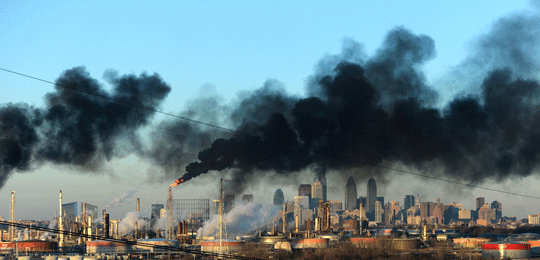
Philadelphia’s Energy Future
Zein Nakhoda offered the below testimony to the Philadelphia City Council’s Special Committee on Energy Opportunities Public Hearing on March 13, 2015 as a member of the Maypop Collective for Climate and Economic Justice and 215 People’s Alliance.
Philadelphia’s energy future and adaptation to changing environmental conditions is increasingly important to working families’ health, safety, and economic security over the long term. For this reason, we support Council defending municipal ownership of Philadephia Gas Works, our city gas utility; we uphold public ownership and local governance as paramount to the democratic energy future we need.
The acquisition of UIL Holdings by Iberdrola validated Council’s concerns around selling PGW. Consumers and workers should not be without say or knowledge about decision-making of our utility services. The proposed sale to UIL put good jobs and protections for seniors and low-income customers at risk, with inadequate protections for PGW’s Philadelphia workforce.
As a publically owned utility, PGW is obligated to protect rights of low-income residents and working families. Philadelphians can keep PGW accountable through our elected officials – in the case of increased rates, poor service, and in shaping the direction of our energy economy.
While we applaud efforts to retain municipal ownership of PGW, we’re concerned about proposals to have PGW anchor a “fossil fuel energy hub” in our city. Philadelphia must engage broader challenges of energy transition to protect against economic and environmental threats associated with fossil fuel extraction and transport and resultant climate change.
Proposed fossil fuel infrastructure, including pipeline networks, oil by rail, gas liquefaction, and compressor stations pose significant safety and health risks to Philadelphia residents and workers with questionable economic return for Philadelphians.
Climate change, a product of decades of fossil fuel energy use, increasingly threatens Philadelphia’s financial security and infrastructure. The frequency and magnitude of superstorms are increasing, along with frequency of 100-year and 500-year floods, disproportionately impacting low-income families, communities of color, and workers. Utility companies learned from the millions of dollars worth of damages wrought by Hurricane Sandy that environmental sustainability and resilience is economically necessary to maintain services and protect customers. Philadelphia should not build its energy future on fuels that exacerbate environmental and economic disaster.
Philadelphia should not sacrifice the long term security of residents and workers for the short-term gains of fossil fuel corporations. Nor should it rely on precarious and limited resources such as shale gas – which requires toxic and destructive fracking and transport practices in order to get to Philadelphia.
The energy transition we need would create living wage “climate jobs” – green union jobs in renewable energy and energy efficiency sectors that mitigate the pollution in our communities and curb carbon emissions.
This transition is possible. For example, a Center for American Progress study found that 2.5 to 4 more jobs are created for each million dollars spent on energy efficiency measures, like retrofitting and mass transit, than jobs from one million dollars spent on oil and natural gas operations.[i]
Energy decisions made in the coming years by major cities like Philadelphia will greatly determine the outlook of our economic and environmental security for decades to come. While we support municipal ownership of PGW, we hope it can be part of a bold clean energy transition that takes care of residents, workers, and future generations.
###
[i] Pollin, Robert et al. University of Massachusetts, Amherst. Department of Economics and Political Economy Research Institute. “The Economic Benefits of Investing in Clean Energy.” Center for American Progress. June 2009 at 28. This study looked at conventional oil and gas; unconventional oil and gas, like that produced from the Marcellus Shale, is far more expensive and so number of jobs created per million dollars invested would be lower.
Photo credit: Tom Kelly IV




